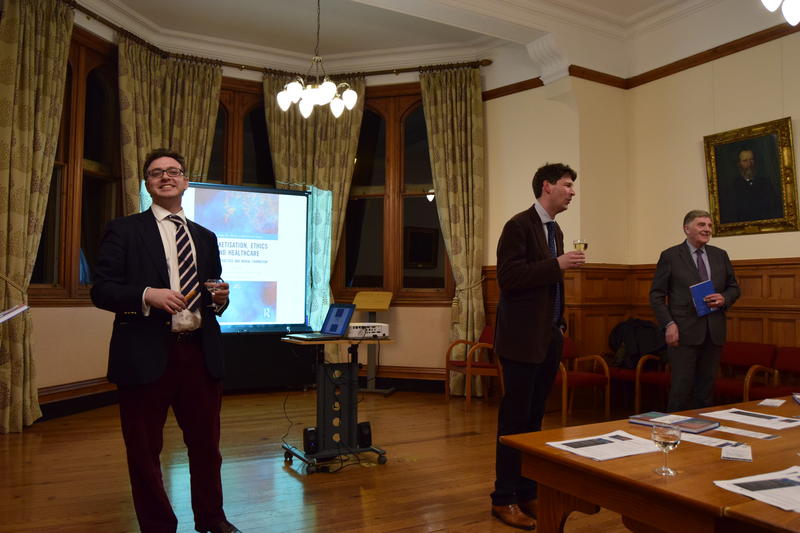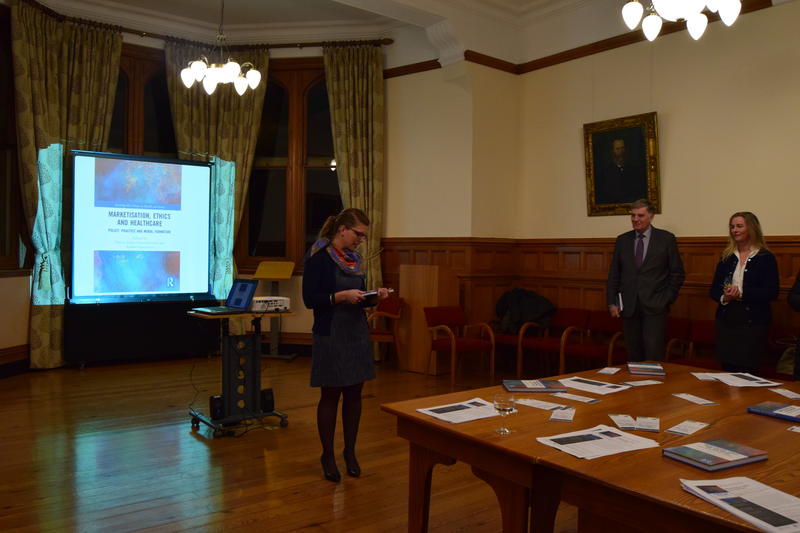What has theology got to say about healthcare?
What has theology got to say about healthcare?
Earlier this year, a team of theologians from the Faculty of Theology and Religion got together with a doctor from the Medical Sciences division to celebrate the publication of their cutting-edge interdisciplinary book, Marketisation, Ethics and Healthcare. The primary question the book seeks to answer is, ‘How does the market in its various forms affect and redefine healthcare ethics?’ In it, the contributors that hail from medical ethics, theology, law, social and public policy discuss the wide-ranging impact of the marketisation of healthcare on the work of medical professionals. They suggest a number of methods, going forward, for prioritising the value of compassion and ensuring it remains a motivating objective in the administration of healthcare treatments.
Our DPhil candidate, Naomi Richman, caught up with one of the books editors, Associate Professor of Christian Ethics Joshua Hordern, to find out more about the book:
Tell us a little about the new book, Marketisation, Ethics and Healthcare.
It’s very much a collaborative project. It’s coedited by theologians and a doctor, with a wide variety of contributors, and explores how marketisation, in its various forms, shapes and affects healthcare. The marketisation of healthcare implies a kind of paradigm shift away from, or transformation of, public, solidary or communal ideas and structures of healthcare provision towards individual health-producers and consumers as the ultimate reference point. The transformation is complex, involving economic as much as political, cultural and hence moral elements. Whilst some contributors suggest the marketisation of healthcare pervasively threatens the integrity of medical practice, others are not fundamentally opposed to healthcare marketisation, but rather seek to discipline possible excesses.
The first part of the volume explores contrary interpretations of ‘marketisation’ on a systemic level, in particular with a view to organisational-ethical formation, and with a view to the locus of ethics and medical ethics within the bigger political-economic picture. The second part presents the marketisation of healthcare at the level of health and care policy-making, discussing the ethical ramifications of specific marketisation measures. Finally, Part III examines healthcare workers’ personal moral standing in a marketised healthcare system, particularly with a view to preserving and enriching compassionate care, a concern that goes deeper than, but always threatens to become, a mere political slogan.
We are particular excited about the interdisciplinary quality of the book with authors drawn from fields including theology, philosophy, healthcare, sociology, law and economics. Another key marker of the volume is the range of career stages incorporated. The British Academy, who generously funded the underlying project in partnership with co-editor Dr Andrew Papanikitas and the Royal Society of Medicine, emphasised the importance of incorporating fresh voices from early career researchers alongside more established colleagues. Dr Therese Feiler, who so expertly led the conception and editorial work on this complex volume, and to whom thanks are particularly due, represents precisely this kind of fresh thinking.
What is your chapter about?
My chapter in book argues that covenantal thought and practice, rooted in Christian theology, has the capacity to discipline marketisation processes in service of an ethos of gracious compassion in healthcare. It engages critically and synthetically with various other chapters in the volume – in particular Feiler’ theological analyses of Diagnosis Related Groups, Jonathan’s Herring precise critique of Personal Budgets and Papanikitas and Jani’s assessment of Defensive Medicine. It argues that the key themes of ‘care’ and ‘work’ can be illumined by a covenantal approach which works judiciously to discipline the benefits and risks of healthcare marketisation. Constructively, it draws on parallels in the Armed Services to argue for five required characteristics of a written and institutionalised Healthcare Covenant between health and care workers and the public. Drawing on traditions of pastoral and political theology to explore the psychological and social influences of marketisation, the chapter provides the bridge between the systemic issues of Part I, the policy concerns of Part II and the questions of professional ethics considered in Part III.
What role do theology and religion have to play in the world of healthcare?
This is something I’ve learnt about as I’ve gone along. The view I’ve come to is that theology and religion have a particular capacity to reframe and critically investigate healthcare’s predominantly technological and biomedical self-understanding. Such reframing, typically drawing on ancient streams of thought and practice, can enable a quality of pastoral insight which is much needed in present-day healthcare. For example, by bringing theological and religious traditions of enquiry concerning themes such as compassion, fault, suffering and promise into detailed engagement with the everyday questions of healthcare, fresh insights can arise and space can be created for colleagues to adopt changed outlooks and practice. This emphasis on ‘creating space’ is particularly important – colleagues in healthcare typically have thoughtful and sophisticated ways of understanding their work. However, the intense pressures under which many work commonly mean that they do not have opportunity to reflect. Theology and religion have a competence and a responsibility to make opportunities for healthcare colleagues’ reflective understanding to be brought into conversation with ways of thought and life which can enrich, encourage and, where appropriate, challenge. The outcome of all this should be strengthened or changed practice and, ideally at least, a clearer sense of what healthcare is for. To quote Barth, health is ‘the strength for human life’ rather than being the meaning or purpose of human life. The care of health goes best when it has regard for the horizon of human life – the desire of most people not to be ultimately defined by their health or lack of it. The categories of narrative, story, life-course or, on an Augustinian note, pilgrimage are particularly important.
Similarly, what can conversations with those working in healthcare contribute to our work in theology and religion?
This is a key question. Unless scholars in the humanities are listening carefully and working alongside colleagues in healthcare, they will end up disengaged from the actual questions which face our neighbours and fellow citizens in their journeys through life. Theology and religion are no exceptions to this. The task of reframing requires detailed knowledge of the texture and complexity – and very often existential stress – of healthcare work if it is to say anything beneficial. Just this kind of work alongside healthcare colleagues has helped me to see further where a theological imagination should be focussed but equally, on many occasions such colleagues have shown me how certain avenues of enquiry as unfruitful. There is no substitute for the on-the-ground, often highly technical knowledge which comes from working and walking alongside those whose daily work you are attempting to understand. Crucially, this is equally true of those who do not work in healthcare but participate in healthcare in other ways – most obviously patients, relatives and carers. Continuing, ongoing conversations with patient organisations is extremely important, especially for theological and religious traditions whose wisdom is formed by reflection on the human condition – on themes such as suffering, compassion, hope and joy.
Do you have any plans to explore the relationship between theology, ethics and healthcare further, and if so, what are they?
Yes - I am currently leading collaboration on a project in the field of precision medicine with colleagues from social sciences, medical sciences and patient organisations. The project has economic, political, scientific and ethical dimensions all of which hold great interest for Christian ethics. This builds on earlier published work predominantly with cancer specialists but will now expand to include consideration of rare diseases. The intention is that moral theology, in concert with other disciplines, can serve as a critical friend for colleagues in this field. Such colleagues increasingly express significant unease at some of the trends within it and want to be able to investigate the rhetoric which surrounds it, drawing on a wider set of modes of investigation than are available in medical sciences. The possibilities of a university such as ours are clear to see in such a context. More broadly, it is characteristic of the Faculty of Theology and Religion and the Humanities Division, both of whom are supporting this project in various ways alongside the AHRC and the Wellcome Trust, that we are growing inter-divisional and inter-institutional partnerships such as this.
Thank you for time, Joshua, and I can’t wait to read the book!
For more on Marketisation, Ethics and Healthcare, see:




